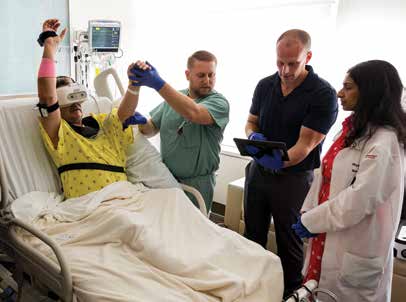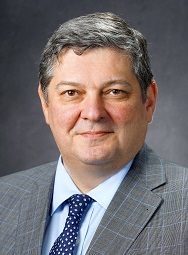
Left to right: Keith Sabin, PT, a Penumbra staff member, and Rohini Kumar, MD, assist a patient using the REAL Immersive Virtual Reality System for stroke rehabilitation.
Cooper University Health Care recently became the first hospital globally to use a new virtual reality (VR) system for patient rehabilitation after a stroke.
Before the commercial launch of the REAL Immersive Virtual Reality System, a team of physicians and therapists at Cooper worked closely with California-based medical device producer Penumbra in the research and development phase for the new system. These field tests were instrumental in refining the technology for patient use.

Tudor G. Jovin, MD, Chief and Chairman of Cooper Neurological Institute, is an internationally renowned neurologist and researcher who has transformed the field of stroke care and made major contributions to the field of neurology.
“As an academic health system and a leading provider of advanced stroke and neurological services, we are committed to adding promising new treatment modalities to our complement of therapies,” said Tudor G. Jovin, MD. “VR has emerged as a new approach to treatment in stroke rehabilitation settings over the last ten years. We are proud of our role in the development of this new system and are excited to be the first hospital in the world to use it with our patients.”
The REAL Immersive System is a virtual reality and display system that interactively displays and tracks upper extremity rehabilitation exercises for adult patients with a combination of virtual environments and full presence tracked avatars for visual feedback. These rehabilitation exercises are intended to be conducted in a seated position in a clinical environment and prescribed and supervised by a medical professional who is trained in rehabilitation therapy, according to Penumbra.
The system features a head-mounted display component and a series of sensors that are placed on the patient. A trained therapist uses a handheld tablet device to choose from a series of game-like activities for the patient. The sensors have mechanical and electrical components that can measure motion and direction in the physical space and translate that information into a virtual environment.
“The therapist watches the patient maneuver through the exercises on the tablet in real time and can increase or decrease the level of difficulty of the activities, depending on the patient’s progress,” explained Dave Owens, Director of Rehabilitation Services. “The system monitors and securely records all the information for the patient’s record.”
The Penumbra system differs from other versions of VR systems in that it’s completely mobilized and wireless. Everything needed for use with a patient is contained in a simple, portable charging case. Yet, its customized hardware and software can track the full range of motion of the upper body. Because the experience is three-dimensional, or fully immersive, the therapeutic exercises feel “real” to the patient. Immersive activities have been shown to stimulate rewiring of the brain after injury, such as stroke.
“After a stroke, task-oriented arm training of the upper and lower limbs can help the brain to ‘re-program’ itself and form new neural connections,” explains Rohini J. Kumar, MD, Physical Medicine and Rehabilitation Physician. “These new connections stimulate recovery of motor skills in patients following stroke. Virtual reality may be useful to augment rehabilitation of the upper and lower limbs in patients suffering from stroke and other neurological injuries.”
For more information on Virtual Reality for Stroke, visit CooperHealth.org/VRforStroke. To make an appointment with a Cooper neurological or physical medicine and rehabilitation specialist, please call 800.8.COOPER.
